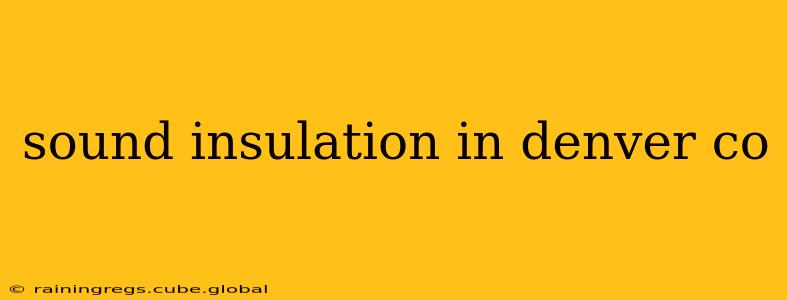Denver's vibrant urban landscape, coupled with its growing population, means noise pollution is a significant concern for many residents. Whether you're battling noisy neighbors, disruptive street traffic, or simply seeking a more peaceful home environment, understanding sound insulation is crucial. This guide delves into the specifics of sound insulation in Denver, considering the city's unique climate and construction practices.
What are the common noise problems in Denver homes?
Denver's diverse housing stock, from older Victorian homes to modern high-rises, presents unique acoustic challenges. Common noise problems include:
- Traffic Noise: Denver's busy streets and highways can significantly impact nearby residences, particularly those located close to major thoroughfares.
- Neighbor Noise: Apartment living and even densely populated neighborhoods can lead to noise issues from conversations, music, and other household activities.
- HVAC Systems: Older or poorly maintained HVAC systems can create significant noise pollution within the home.
- Airborne Noise: Sounds traveling through the air, like conversations or music, can easily penetrate less-insulated walls and windows.
- Impact Noise: Sounds generated by impacts, such as footsteps, dropped objects, or appliances, can travel through floors and ceilings, particularly in multi-family dwellings.
What are the best soundproofing materials for Denver homes?
The selection of soundproofing materials depends on the type of noise you're trying to mitigate and your budget. However, some top contenders consistently prove effective:
- Mass-Loaded Vinyl (MLV): A heavy, flexible material that effectively blocks airborne sound transmission. Its density is key to its sound-dampening capabilities.
- Sound Absorption Panels: These panels are designed to absorb sound energy, reducing reverberation and echoes within a room. They are particularly useful for controlling noise within a space rather than blocking it from entering.
- Green Glue Noise Dampening Compound: This viscoelastic damping compound is applied between layers of drywall to significantly reduce sound transmission through walls and ceilings.
- Resilient Channels: These metal channels create an air gap between drywall and framing, reducing the transmission of vibrations and impact noise.
- Double-Pane Windows: Replacing single-pane windows with double- or even triple-pane windows significantly reduces external noise intrusion. Consider windows with laminated glass for enhanced noise reduction.
How much does soundproofing cost in Denver?
The cost of soundproofing varies drastically depending on several factors:
- Extent of the project: Soundproofing an entire house is substantially more expensive than treating a single room.
- Materials used: High-quality materials naturally command a higher price.
- Labor costs: The cost of professional installation significantly impacts the overall price.
- Complexity of the project: Projects involving structural modifications or specialized techniques cost more.
It's best to obtain quotes from several reputable contractors in the Denver area to get an accurate estimate for your specific needs.
How can I find a qualified soundproofing contractor in Denver?
Finding a qualified contractor is essential for a successful soundproofing project. Consider these steps:
- Ask for referrals: Seek recommendations from friends, family, or neighbors who have completed similar projects.
- Check online reviews: Examine online reviews and ratings on platforms like Yelp and Google My Business to assess the contractor's reputation.
- Verify licensing and insurance: Ensure the contractor is properly licensed and insured in Colorado.
- Request multiple quotes: Compare quotes from at least three different contractors to ensure you're getting a competitive price.
- Ask about experience: Inquire about the contractor's experience with soundproofing projects, particularly in Denver's unique climate and housing types.
What are the building codes regarding sound insulation in Denver?
Denver's building codes address sound transmission, particularly in multi-family dwellings. These codes typically specify minimum sound transmission class (STC) ratings for walls and floors. It's crucial to check the current codes applicable to your specific project with the City of Denver's building department.
What are some DIY soundproofing options for Denver homes?
While a professional installation often provides the best results, several DIY options can improve sound insulation:
- Thick curtains or drapes: Heavy curtains can help absorb sound and reduce noise transmission through windows.
- Rugs and carpets: These soft floor coverings help absorb impact noise and reduce reverberation.
- Bookshelves and furniture: Strategically placed bookshelves and furniture can help absorb sound waves.
- Adding sealant around windows and doors: Sealing gaps and cracks reduces noise intrusion.
However, remember that DIY solutions are rarely as effective as professionally installed soundproofing systems. They're often best suited for supplementing professional work or addressing minor noise issues.
This guide provides a comprehensive overview of sound insulation in Denver, covering various aspects from common noise problems to DIY solutions. Remember to consult with qualified professionals for larger projects to ensure effective and long-lasting results. Your peaceful Denver home awaits!
